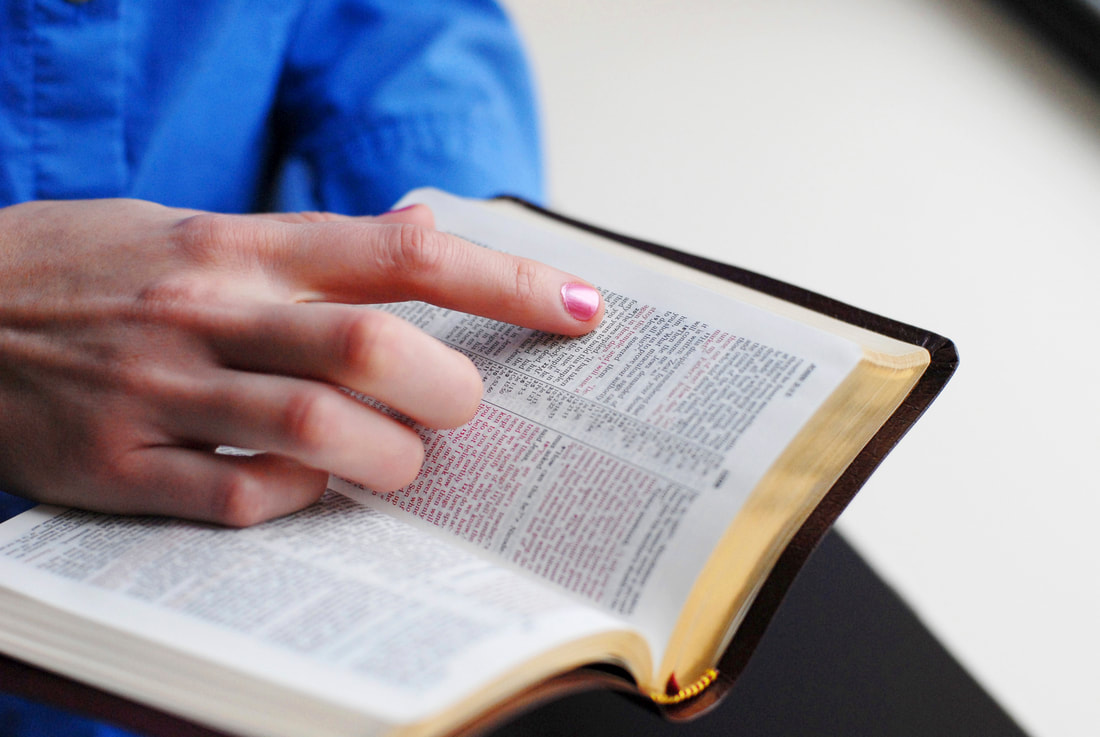|
In the previous blog, “The promise to Mary: To “keep and ponder” or to only “wonder””, we looked at how Mary dealt with God’s promises in her life: She “kept” and “pondered over” them and was a woman of faith.
But not everyone in the Bible receiving such a promise had the same reaction, or faith. In the gospel of Luke, we read about two miraculous births. The first one is that of Jesus. The second one was that of John the Baptist, Jesus’ cousin. His father, Zechariah, also received a visit from the same angel as Mary had done but doubted the promise that he received. He said, ““How shall I know this? For I am an old man, and my wife is well advanced in years” (Luke 1:18). He was an older man, righteous for God and knew the law (Luke 1:6) and was performing a sacred duty in the temple when he saw the angel. But he was unable to react in the same way that the much younger Mary had done. Perhaps, one could ponder, she was less affected by religious thinking, and more open to just receive? The words of Jesus also come to mind here: “Nor do they put new wine into old wineskins, or else the wineskins break, the wine is spilled, and the wineskins are ruined. But they put new wine into new wineskins, and both are preserved?” (Matthew 9:17). Which is easier: To receive a divine promise of a child that will be born in one’s old age, or to be told that you would give birth to the Savior of the world, yet had never been with a man? Still, Mary’s response was the response of faith. However, God did stay true to His promise to Zechariah. But because of Zechariah’s unbelief, he was temporarily struck with muteness (he was unable to speak). He later regained the ability. God was faithful to His promise. But He was not, perhaps, honored in the same way in this story, because of Zechariah’s lack of faith. Perhaps for this very reason, the name of the child would be John, which means, “The Lord has been gracious.” As we read, it was not a familiar name given in that family. Yet his mother and father made clear that this was to be his name, and the people standing around “marveled” at this (likely because it broke with their traditions; read Luke 1:59-63). Also, John, “God has been gracious,” is a very befitting name for someone who would make way for the coming Messiah, his cousin, Jesus. The coming of Jesus from Nazareth was a transition from old things to totally new things. Like we read: “For the LAW was given through Moses, but GRACE AND TRUTH came through Jesus Christ” (John 1:17). In the very moment Zechariah proclaimed his sons name, he miraculously received the ability to speak again (see verses 63-64). That was certainly grace. You can read the full story in Luke’s gospel chapter 1:5-25 and 1:57-66 (or just the whole chapter 😊). What can we learn from all this? Mary was a woman of immediate faith (and a continuous one). Her response had been, “Behold the maidservant of the Lord! Let it be to me according to your word” (Luke 1:38). Zechariah, on the other hand, had responded, “How shall I know this? For I am an old man, and my wife is well advanced in years.” Perhaps, he had forgotten about the father of his own faith, Abraham, who had to wait until he was 100 years old before he received Isaac, the child of his promise? We see two very different responses. Yet by God’s grace, both promises and births were brought through. God wants our faith. But when it wavers like with Zechariah, God is still faithful to keep what he has promises to us. He will make sure to keep His own end of the bargain and receives glory in that process (Psalm 115:1). Perhaps, as He gives and fulfills such things in our lives, things we can’t believe or are unable to receive, at the same time, He is taking off our “religious glasses” and breaking down thoughts and mindsets in our lives that try to hinder and put a limit on what God can do. Like with Zechariah, He makes all things new. John means “The Lord has been gracious.” Zechariah means “The Lord has remembered.” Indeed, the Lord remembers His promises, and graciously fulfills them. God bless. You might want to also read our article: "How can I get started reading the Bible?" Or this article: "What do I need Jesus for?" SCRIPTURES FOR REFERENCE: “Remember not the former things, nor consider the things of old. Behold, I am doing a new thing; now it springs forth, do you not perceive it? I will make a way in the wilderness and rivers in the desert” (Isaiah 43:18-19). “And he who was seated on the throne said, ‘Behold, I am making all things new’” (Revelation 21:5). “Therefore, if anyone is in Christ, he is a new creation. The old has passed away; behold, the new has come” (2. Corinthians 5:17). “By abolishing the law of commandments expressed in ordinances, that he might create in himself one new man in place of the two (Jew and Gentile), so making peace…” (Ephesians 2:15). “In speaking of a new covenant, he makes the first one obsolete. And what is becoming obsolete and growing old is ready to vanish away” (Hebrews 8:13). “Now faith is the assurance of things hoped for, the conviction of things not seen” (Hebrews 11:1). "For I say to you, that unless your righteousness exceeds the righteousness of the scribes and Pharisees, you will by no means enter the kingdom of heaven" (Matthew 5:20). "Assuredly, I say to you, unless you are converted and become as little children, you will by no means enter the kingdom of heaven" (Matthew 18:3).
1 Comment
By Rune B. Hansen
One night in the fields of Bethlehem, it happened that the angel of the Lord suddenly appeared to some shepherds and said: “Do not be afraid, for behold, I bring you good tidings of great joy which will be to all people. For there is born to you this day in the city of David a Savior, who is Christ the Lord. And this will be the sign to you: You will find a Babe wrapped in swaddling cloths, lying in a manger” (Luke 2:10-12). After this, the shepherds went into Bethlehem and found Mary and Joseph and the promised child, lying in a manger. They then explained what had been told them about the child. We read that “all those who heard it marveled at those things which were told them by the shepherds. But Mary kept all these things and pondered them in her heart” (v. 18-19). It is good to marvel and wonder at such things, which “all those who heard it,” did. However, out of those “all,” only one woman is told to have also “kept these things” as she “pondered them in her heart.” So, Mary “kept and pondered” the words, rather than doubting if what she had been told was true. This is not the first time we read that Mary “kept” God’s word. When she and her husband Joseph could not find the 12-year-old Jesus on the way back from Jerusalem, and had to return to find Him in the temple there, sitting and listening to the teachers of the law, asking questions, etc., she asked the young man: “Son, why have you done this to us? Look, your father and I have sought you anxiously” (Luke 2:48). Jesus' response was, “Why did you seek Me? Did you not know that I must be about my Father’s business?” (v. 49). We then read, “...but His mother kept all these things in her heart” (v. 52). Both these instances are found in the 2nd chapter of the gospel of Luke, but notice the time gap between these two stories: 12 years. Mary likely had a habit of keeping God’s word. She later receives the highest recognition for this attitude by her son, Jesus. One day, as He was speaking to a multitude of people, a woman says to him: “Blessed is the woman that bore you, and the breasts which nursed you” (that woman would be Mary; Luke 11:27). Jesus replies: “More than that, blessed are those that hear the word of God and keep it” (Luke 11:28). In His response, there are several things that we come to understand. 1) “Blessed are the ones that hear the word of God and keep it.” This really alludes to Mary, who has done just that, and this befits the words of the woman. 2) Blessed are “the ones,” or rather, “anyone,” who does the same thing as she did. 3) In this, Jesus indirectly alludes to the fact that He IS the Word of God, having been carried like a promise in His mother’s womb, and finally coming to pass – “The Word became flesh” (John 1::14). What can we learn from this? Mary had faith. When she had been told by the angel that she was to give birth to the Messiah, she responded by saying, “Behold the maidservant of the Lord! Let it be to me according to your word” (Luke 1:38). A word that she surely “kept” and “pondered” on. Mary believed in God’s promise, and that “promise” grew in her belly, although she had never been with a man. Finally, the child was born (a miracle). Everything said about Him was true. He was the Messiah, also know as “The Word of God” (John 1:1). As with Mary, the same goes for us. We too can receive promises from God in faith, and let them grow in us, by “keeping” and “pondering” on them, letting them take form, to finally see them fulfilled. God's Word (The Bible) is filled with such promises to be received. And by the Holy Spirit, personalized promises can be received, too. God Bless. You might want to also read our article: "How can I get started reading the Bible?" Or this article: "What do I need Jesus for?" SCRIPTURES FOR REFERENCE HERE: "For all God's promises in Him (in Christ Jesus) are yes, and in Him Amen, to the glory of God through us" (2. Corinthians 1:20). "If you abide in Me, and My words abide in you, you will ask what you desire, and it shall be done for you" (John 15:7). "This is the end of the account. As for me, Daniel, my thoughts greatly troubled me, and my countenance changed; but I kept the matter in my heart" (Daniel 7:28). See also: Psalm 1:1-3, and Joshua 1:8. By Rune B. Hansen
Have you ever read this story? In short, it’s a great testimony about God’s kindness to those in need of it. King David decides that he wants to bless any surviving descendant of Saul, and do so because of Saul’s son, David’s late, good friend, Jonathan. David uses the words, “Is there not still someone of the house of Saul, to whom I may show the kindness of God?” (v. 3). He finds out that this man, Mefibosheth, a cripple living in a place called Lodebar, is still alive (v. 4; Lode bar means “pastureless”). He is a son of Jonathan. And for no other reason than to bless the house of his former friend, David, the “shepherd-king,” having once written “He makes me to lie down in green pastures” (Psalm 23:2b), now sends for the crippled man from “pastureless.” He brings him to Jerusalem, the “city of the Great King.” He gives him back the land that once belonged to Saul, his grandfather, and grants him a lifelong seat at the king’s table, and to eat from it continually (v. 7). Many of these things speak about what God has done for us through Christ Jesus. What I really appreciate about this story, is that Mefibosheth has done nothing to deserve these things. In fact, he’s just related to the right person. He doesn’t expect it either. The first thing David says to him when he is brought to Jerusalem is even, “Do not fear” (v. 7), indicating that Mefibosheth was afraid of David - he knew that his grandfather had persecuted him. We were also the enemies of God. He is the sovereign ruler of heaven and earth and had every right to punish us because of our sins. But someone near and dear to God also died, and because of Him, God now wants to bless and restore us. Not because of anything we have done, but because now, we, through faith, are related to this person, His Son, Jesus. It all applies. He brings us out of darkness, out of our “pastureless” state, and we can now call Him our Good Shepherd. He can restore things to us that have been lost, and also, He lets us sit together in the heavenly places in Christ Jesus (Ephesians 2:6). He grants us to eat from His table – kingly rich food for our souls, and daily bread. All this is due to God, who lifts us up and strengthens us, carries us, and promises to continuously do so until our old age (Isaiah 46:4). He is our spiritual rock, that provides us with life-giving water on the journey (1. Cor. 10:4). “Surely goodness and mercy shall follow me all the days of my life; And I will dwell in the house of the Lord forever” (Psalm 23:6). If you have yet to meet The Shepherd and Overseer of men's souls (1. Peter 2:25), please have a look at our articles in "Christianity 101." God bless. By Rune B. Hansen
”...and He said to them, ‘Go into the village opposite you; and as soon as you have entered it you will find a colt tied, on which no one has sat. Loose it and bring it’” (Mark 11:2; NKJV). In the gospel of Mark chapter 11 verse 1, we read that Jesus came to Bethphage and Bethania at the mount of Olives, together with His disciples. From there He sends out two disciples to loosen a colt, the foal of a donkey. After this has happened, He makes His entry into Jerusalem on this said colt. (A side note: it’s interesting to note that on the previous day, Jesus has just cursed a fig tree that had not produced ripe fruits yet. Bethphage, the village that is mentioned in Mark 11:1, does indeed seem to mean “the house of unripe figs”). Now about the colt. The interesting thing about this colt was that it was tied up, and that no man had sat upon it yet. Yet the Lord had said: Loose it. After having been loosened, it was used to carry the Lord to His “exit” in Jerusalem, where a few days later, He was crucified. I suppose that there are many ‘colts’ among believers today. Many might feel tied up, and only desire to step into the ministry the Lord has for them. At the decided point in time, the Lord chose to have the colt released of its ropes and brought to Him. He had a special assignment in mind for it, and now it was the designated time. The colt might not have had much experience, but that did not matter so much to the Lord. He had a plan. And the colt’s assignment was neither small nor unimportant. It also had its share in pointing to Him as the Son of David, the lowly King that comes to His people (see Zechariah 9:9). As they rode into the city of Jerusalem, all focus was on the Lord – and rightly so. The colt was not the focal point of praise, but rather, Him who sat upon it. The experience must have been rewarding for the colt, too, though. A King was ‘lifted up,’ and the colt had become the vehicle of the King of Kings. Many people then took branches of palm trees to celebrate His coming, and shouts of joy and praise were heard all around, both “Hosanna!” and “Blessed is He who comes in the name of the Lord!” (John 12:13; NKJV). The Lord also wishes to loosen us from all things that bind. He wants to bring us close to Him, and to use us in ways that honor Him, regardless of our experience. That lift Him up, and welcomes Him in, as we do so together with many disciples. By Rune B. Hansen
There was a big hotel. Many people were coming and going, some to the dining hall, some to their rooms, some were going to business meetings, and yet a few others wanted to go up with an elevator. There were four elevators. One called “Buddha,” one called “Muhammed,” one called “Jesus,” and one called “the pope” (there are of course many “elevators” out there but let them be for a different story). The first elevator, “Buddha,” was broken. Nobody could fix it. A few people really wanted to use this elevator and sat down to think long and hard about what to do. They meditated on this for ages, but no proper answer ever came out of it. The elevator remained broken, relatively speaking. There were still more that wanted to go with the second elevator, “Mohammed.” They carefully read the instructions on the wall of the elevator and tried to follow them as best they could. They prayed and they fasted, they recited texts and tried to outweigh their bad deeds with their good ones. But the elevator went nowhere – simply nowhere. In frustration, some of them left it, proclaiming, “these instructions were FALSE, they never got us anywhere!” Some did remain, confident that one day, having done their best to follow said instructions, they would finally be brought to the top floor. How wrong they were. There was a third elevator, “Jesus.” Not many were willing to take this One. While the other elevators were broad and huge, this particular way, “Jesus,” was quite narrow. Certain things had to be left behind to fit in there, and most people, not wanting to part with their old belongings, kept at a distance. A few, however, turned away and entered in. Having now found their place, they witnessed a peace they had not found anywhere else in the world. A sign on the wall said, “The way, the truth, the life.” Only one button, an “up”-button, was there – and it was pushed. It went to the Highest floor, and then down again. (You can still take it). A fourth elevator was named “the pope.” It was made of gold and silver and precious stones and was very prestigious and spacious. All were allowed in. It was decorated with man-crafted figurines, some angelic, but mostly human. It was huge, and a fee had to be payed to enter in. Many chose to do so, and payed that costly price. Like the third elevator, this one had only one button. It read “the pope,” and had an upward arrow on it. It too, was pushed, and down it went. By Rune B. Hansen
Giving everything to God, such as our problems, anxieties, worries, dreams, desires, selfish ambitions, etc. can be difficult. Yet He wants us to do this, so that He can have it all, and fill those spaces in our lives (from worry to peace, anger to joy, bitterness to rejoicing, etc.). It can be likened to a chess game. There, you have two opposing parties. On the one side, you have God’s white pieces, ready to assist us with the things that occupy too much in our lives. On the other hand, we have our black pieces, that might fill too much in our lives. They represent the many things that God wants us to give over to Him (as mentioned above). God wants us to make a move. If we make a move towards Him, and say, “I want you to have this,” then God will make a move towards us, and soon take that piece out of the game. It no longer belongs to us but to Him (He now fills this spot). As we continue to move, He will deal with these “chess pieces,” or issues, one at a time (or several). He has many good and brilliant moves ahead to make on our behalf when we come to Him. In the end, when all is said and done, no matter what, the victory will be His. He has already won the battle for our lives (on the cross), and if we have said “yes to Jesus,” He will be glorified through that. So, we might as well give over our “pieces” now, and not keep them to ourselves. It would only be in vain. If then, we have given everything over to God, He now fills everything in us, and on the “chess board” of our lives. He wants us to bring everything to Him, that He may fill it, be glorified by this, and bring His peace into play. We can come as little children, and certainly should. (Matthew 18:3). If you want to know more about following Jesus, and saying "yes" to Him, please look around on the website (and particularly, you can read the article "What do I need Jesus for?"). God bless. |
AuthorRune B. Hansen. 40 yrs. of age. Writer, content creator, freelance translator, believer in & follower of Jesus. ArchivesCategories |
- Home
- Experiences with God
- Basics
-
Videos / Explanations
- Who is Jesus ?
- Near Death Experiences (NDE)
- Good explanations : God explanations
- Hope for everyone
- The Last Reformation - Full Movies
- The Atheist Delusion - Full movie
- The struggle between darkness and light
- Atheist professor became a christian
- Jesus is love
- Muslims meet Jesus
- Who is the Jewish Messiah?
- Contact us
- The Y2J Blog






 RSS Feed
RSS Feed
